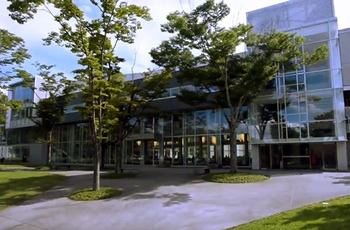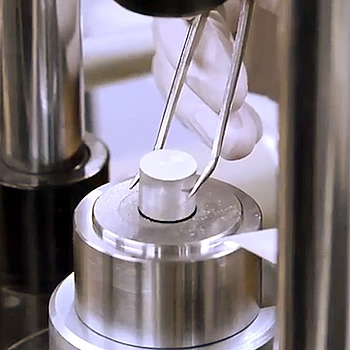東北大学 大学院工学研究科・工学部 知能デバイス材料学専攻
ナノ材料物性学講座 強度材料物性学分野
吉見研究室 Yoshimi Lab.
Ultra-High Temperature Materials Group
Depertment of Materials Science, Tohoku University
About Us - 研究室について
History - 歴史

Our research laboratory has a tradition of excellence and a history of more than half a century as the center of materials strength and high-temperature materials studies at Tohoku University after establishment by Seiichi Karashima (Professor Emeritus, Tohoku University) in 1960. Hiroshi Oikawa (Professor Emeritus, Tohoku University, 1982–1997) and Kouichi Maruyama (Professor Emeritus, Tohoku University, 1997–2013) became subsequent laboratory leaders. We have achieved spectacular results and continue to lead the world in the fields of materials strength and high-temperature materials, such as the high-temperature strengths of metals and intermetallic materials, creep deformation mechanisms, grain boundary engineering, fracture and fatigue, and deformation theory.
当研究室は、1960年に辛島誠一先生(東北大学名誉教授)によって開設されて以来、東北大学における材料強度学と高温材料学の学び舎の中心として、半世紀以上の歴史と伝統を誇る講座です。
この間、及川洪先生(東北大学名誉教授;1982年~1997年)、丸山公一先生(東北大学名誉教授;1997年~2013年)と継承され、金属材料や金属間化合物の高温強度、クリープ変形機構、粒界工学、破壊と疲労、転位論など材料強度学、高温材料学分野で輝かしい成果を挙げ、世界をリードしてきました。
Academic and R&D Fields - 学問・研究分野

Our research laboratory has maintained its history and tradition of excellence while addressing the demands of a new era. Our main research field is materials strength and high-temperature materials studies that solve problems affecting the global environment and energy resources. Structural materials support the very foundation of our lives, from giant structures such as plant facilities, buildings, bridges, and tunnels to transportation equipment, including automobiles, Shinkansen trains, aircraft, rockets, and even portable electronic devices. Structural materials are used to stably retain the form of the structure for a long time; however, the properties of materials drastically change depending on their usage environment. Therefore, increasing the lifetime of materials in diverse usage environments must be considered, and thus we study the physical, chemical, and mechanical properties of materials to understand what determines the lifetime of materials. Furthermore, we propose materials design guidelines based on the obtained insight. Moreover, we will breathe new life into the field of high-temperature materials by creating new materials based on our materials design principles. We are currently focusing on heat-resistant steel, refractory metal-based super alloys, and heat-resistant ceramics.
当研究室は、これまでの歴史と伝統を引き継ぎ、さらに新時代の要請、すなわち地球環境問題やエネルギー資源問題に対応するための材料強度学と高温材料学を主とした研究領域としています。
構造用材料は、例えばプラントやビル、橋、トンネルなどの巨大構造物から自動車、新幹線、旅客機、ロケットなどの輸送機器、さらには携帯用電化製品にいたるまで、私達の生活基盤を支えるとても大切な材料です。構造用材料は、構造体の形状を長期間、安定して維持することを目的として用いられますが、使用環境下によって材料の性質は大きく変化します。そのため、多様な使用環境下での材料の長寿命化を考えなければなりません。
そこで当研究室では、材料の寿命を決定付けているものが何なのかを明らかにする目的で、材料の物理的・化学的・機械的性質について研究をしています。また、得られた知見に基づいて、材料設計指針の提案を行っていきます。
さらには、自らの材料設計指針にのっとって、自ら新しい材料の創製を試み、高温材料分野に新風を吹き込んでいきます。近年は,耐熱鋼や高融点金属基超合金,耐熱セラミックスなどの研究に対して重点的に取り組んでいます。
Research and Education Philosophy - 研究教育理念
The research and educational philosophy of our research laboratory is to contribute to society through research activities and accomplishments that protect the Earth’s environment and form the foundation for global peace and the prosperity of humanity.
“Contributing to society through research activities and accomplishments” is nothing less than writing academic papers, which will be global common assets, and publishing in academic journals. Therefore, we routinely teach writing of academic papers and submission to academic journals to undergraduate and graduate students.
Our educational philosophy is “high-temperature materials research is like going a long way with a heavy load.” Excellent durability is required in structural materials.
当研究室の研究教育理念は、研究活動と研究成果をもって地球環境を守り、世界平和と人類繁栄の礎となるべく、社会に貢献することです。
「研究活動と研究成果による社会貢献」とは、すなわち、広く世界の共通財産となる学術論文を執筆し、学術雑誌に公開することにほかなりません。したがって、学生・大学院生の皆さんには、平素より学術論文の執筆と学術雑誌への論文投稿を指導しています。
「高温材料の研究は、重き荷を負うて遠き道を往くが如し」が当研究室の教育理念です。構造用材料の宿命として,優れた耐久性が求められます。
Research Environment in Laboratory - 研究教育環境
Our research laboratory can handle all of the following in-house: materials creation (arc melting, high-frequency melting, plasma melting, spark plasma sintering, environmentally controlled heat treatment, etc.), materials evaluation (compression testing, tensile testing, bending testing, high-temperature creep testing, hardness testing, nanoindentation, thermal expansion testing, thermogravimetric testing, etc.), materials analysis (differential thermal analysis, ultrasonic vibration analysis, X-ray diffraction analysis, scanning electron microscopy, tunneling electron microscopy, etc.), and materials theory (first-principles calculations, molecular dynamics calculations, and finite element calculations). Therefore, we can flexibly support various requests over a wide area from researchers and industry. Undergraduate and graduate students can develop strong technical skills while carrying out daily research activities, gaining experience and practice using various types of experimental equipment for materials synthesis and processing, evaluation, analysis, and simulation. Our research laboratory is international, and thus communication skills could be enhanced by working with students from different countries, including South Korea, China, and France and through collaboration and academic interaction with research organizations and research groups worldwide.
当研究室では、材料創製(アーク溶解、高周波溶解、プラズマ溶解、放電プラズマ焼結、雰囲気制御熱処理等)、材料評価(圧縮試験、引張試験、曲げ試験、高温クリープ試験、硬さ試験、ナノインデンテーション、熱膨張試験、熱重量試験等)、材料解析(示差熱分析、超音波振動解析、X線構造解析、走査型電子顕微鏡、透過型電子顕微鏡等)に加えて、材料理論(第一原理計算、分子動力学計算、有限要素計算)のすべてを研究室内で一貫して行うことができるようになっています。したがって、研究・産業分野からのあらゆる要請に対して柔軟かつ広範囲に対応できる体制が整っています。また、学生・院生の皆さんにとっては、材料合成、材料加工から分析・解析、そしてシミュレーションまで数多くの実験装置に触れ修練を積む機会に恵まれているため、日常の研究活動の中で優れた実験スキルを修得できます。さらに、韓国や中国、フランスをはじめ海外からの留学生が数名在籍しているほか、海外の研究機関・研究グループとの共同研究、学術交流を通して国際感覚と国際コミュニケーション能力が養われる環境になっています。